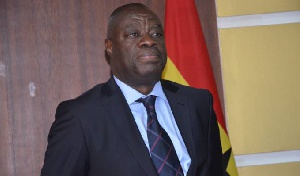 Business Development Minister, Muhammed Ibrahim Awal
Business Development Minister, Muhammed Ibrahim Awal
Government has begun informal talks with key financial institutions on how to reduce the cost of credit and make same available to the private sector to spur growth, Business Development Minister, Muhammed Ibrahim Awal, has told the B&FT in an interview.
“We are engaging the banks. We have to sit down and work together with financial institutions to support businesses. Some banks are created for specific reasons, including the EXIM Bank, Agricultural Development Bank (ADB), National Investment Bank (NIB) and others. We will have deliberations with those banks to help reduce interest rates on loans,” he said.
When he met the Diplomatic Corps on Wednesday, the president, himself, said his government will “introduce incentives that will encourage our banks to provide affordable credit and other financial services to SMEs and launch a new wave of viable industries across Ghana.”
The private sector has often grumbled about what it sees as unbearably high rates of interest on loans, which hold it back from realising its fullest potential.
The Central Bank reports, for example, that average lending rate to individuals and businesses by universal banks peaked at 32percent per annum as at November, 2016.
In the non-bank financial Institutions sub-sector, especially microfinance companies, lending rates are as high as 100 percent per annum.
The high rates on government securities, which peaked at 24percent per annum in 2016, have often been cited as a major drawback as commercial banks prefer to invest in those than lend to the private sector.
The appetite of commercial banks for Treasury Bills reached a new height in 2016, as they invested about GH¢11.27billion into the highly perceived risk-free instrument --the highest investment in government bills for 10-years.
The value of banks’ investment in Treasury-bills for 2015 was about 33 percent more than in the previous year despite a fall in T-bill yields, as a challenging and costly business environment fueled loan repayment defaults in the banking sector.
Mr. Awal is of the view that with the creation of a business-friendly environment, which includes improved macroeconomic indicators, banks can become enablers of growth, with the right deliberations and incentives.
“We need the banks to be the enablers for us. We will engage key stakeholders, including banks, to make it possible for businesses to access cheaper credit to grow. We think we can do serious and continuous deliberations with the banks and very soon the macroeconomic environment will improve and businesses will benefit,” he said.
The erstwhile Mahama-led administration, in November 2016, noted that it was exploring options, including the use of regulation or executive instrument, to bring down interest rates. The initiative was vehemently opposed by banks and other financial institutions.
Mr. Awal noted, however, that the Akufo-Addo-led administration will not be using an executive instrument, regulation or force, to make banks offer credit at cheaper rates.
“Force doesn’t work and how far can force get you? What we have to do is continuous engagement with these institutions. T-Bill rates and inflation are falling, meanwhile six months ago, you couldn’t have said that. In a short time, the system will improve,” he added.
He reiterated the pledge he made at his vetting, to create 20 or more big companies, saying the move has the full backing of the President, and that measures are underway to make it happen.
“We need to hand-hold them [businesses], and hand-holding includes putting deliberate policies in place to make them grow. Some will call it protection but it is not protection. We need to hand-hold them, it is done everywhere.
Handholding them means the introduction of a lot of innovation, financial muscle and getting businesses outside the country to partner them and later transfer the knowledge,” he added.